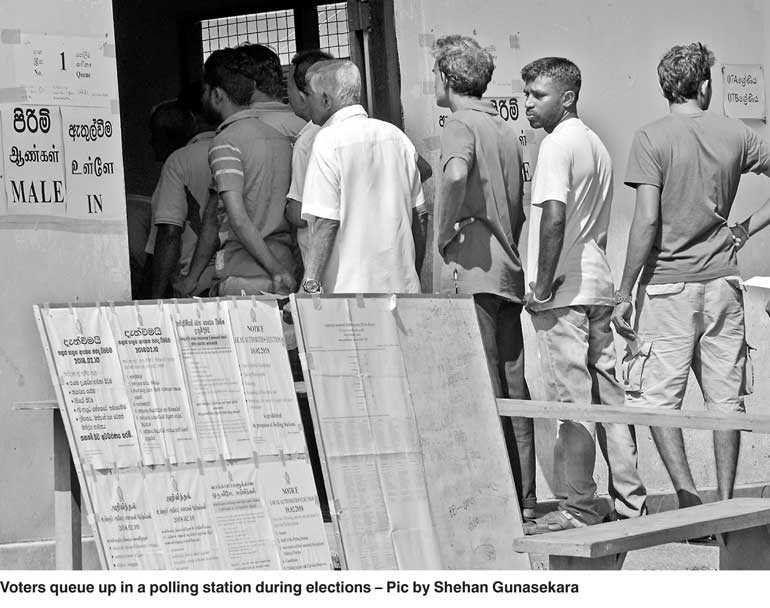Sunday Feb 15, 2026
Sunday Feb 15, 2026
Saturday, 6 October 2018 00:09 - - {{hitsCtrl.values.hits}}

By Bernard Fernando
It is reported in the press that the UNP and its allies want to hold the oncoming PC elections under the old ‘Preference Voting’ (PV) system while the SLFP favours the new ‘Mixed Voting’ system. At the outset it must be stated that going back to PV system is tantamount to a blatant reversal of the acknowledged election promise given by all political parties at the last Presidential and General elections. It is noteworthy that the main plank of the Late Ven. Sobhitha Thero’s campaign was the abolition of the much detested PV system.
Whither electoral reforms?
The writer has submitted a comprehensive package of proposals on electoral reforms several times during the recent past through the press with copies to Public Committee on Constitutional Reforms, Constitutional Assembly, Election Commission, President’s office, PM’s office, a few concerned party offices, civil organisations and individuals to no avail. The package addressed several important national imperatives triggering from our emerging political culture, which were not adequately dealt with even under the ‘Mixed Voting’ system which went in to disarray due to several reasons.
A simple method
Since the issue at hand is the PC elections I quote below the relevant extract from my package of proposals.
“Wasteful and unproductive electoral system to be replaced by simple, cost and time saving electoral reforms such as, substituting Preference Voting system with ‘District wise party merit lists’ carrying names of political professionals selected under robust eligibility criteria leading to avoidance of Bi-elections, ‘Hung-Parliament’ and ‘Cross-overs’ et al.”
Further, under the proposed system, the number of seats won by each contesting party will be determined by applying proportionate arithmetic to the total number of seats allocated to each district in a province by the Delimitation/Elections Commission. This will ensure that every single valid vote will carry an equal value epitomising the basic tenet of a liberal democracy.
Key success factor
The key success factor of this proposal as mentioned above is based on proper identification and selection of candidates in merit order by the contesting parties against a set of eligibility criteria laid down by the Election Commission in consultation with voters’ organisations such as ‘Paffrel’ and ‘Caffe’. The first step in this direction was taken by ‘Paffrel’ in the form of ‘March 12th Declaration’ at the last elections. Now it is only a matter of improving on those criteria and regularising them as specific eligibility criteria for all candidates.
In this regard, a ‘Citizen’s wish list’ by the writer titled ‘Criteria for selecting election candidates’ was also published by the press and copies were sent to the concerned organisations. Accordingly, the contesting parties will be required to establish and execute a robust, transparent and structured interview procedure to select their candidates in merit order for each district so that the oft repeated claim that the party leader will select his ‘henchaiyas’ can be avoided.
Additional advantages
Readers will appreciate that in addition to benefits arising from the removal of PV system, the following key advantages will accrue to the candidates, system and the country at large.
1) Simplification of the workload of the Elections Department paving the way for election results to be announced before midnight resulting in a tremendous saving of time, manpower and money.
2) Since the selection of candidates in merit order is fully entrusted to the parties concerned, all campaign funds will have to be channelled through the Party in a transparent manner and the candidates will be prevented from raising funds for their individual campaigns thereby absolving them from undue allegations of bribery and corruption as alleged in the infamous list of 118!
3) The Election Commission will find it easy to monitor the campaign expenditure of parties than of individuals.
Conclusion
The above proposals constitute a ‘Model’ of our own anvil with social equality, justice, simplicity and passion for high productivity forming its ‘Boiler-Plates’. Therefore, looking for examples from other countries is superfluous.
We appeal to all sensible citizens, academics, politicians and civil activists to carefully study the above proposal with an open mind and persuade the authorities to stop breeding more unprofessional politicians draining the resources of our country already burdened with a colossal debt portfolio and low productivity.